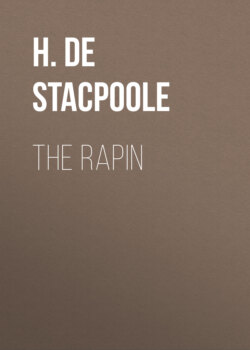Читать книгу The Rapin - H. De Vere Stacpoole - Страница 8
CHAPTER III.
THE FAG END OF A NIGHT AND THE BEGINNING OF A MORNING.
ОглавлениеWhen Gaillard was at last comforted and set writing poems in a corner, the waiters were admitted, the table was cleared, and cards produced.
“Shall we go to the club?” asked Toto.
“No, play here,” answered Struve.
They played loo, and Pelisson kicked the senseless body of De Nani, which had been pushed right under the table for propriety’s sake, when luck went against him.
Toto played furiously, partly to drown the remembrance of his unmanly tears, partly to be successful. His eyes burned, his cheeks were like carnations, and his luck was frightful; but he played with the dogged determination peculiar to him in little things, the pig-headed obstinacy which, had it been allied with talent and poverty, might have landed him in the Ministry or Academy.
A few men dropped in now and then, glanced at the play, saw that the stakes were small,—for Pelisson kept them down,—and yawned out again.
“Toto,” said Struve, as the clock struck twelve, “you’ll be ruined at this rate; better stop.”
“Go on! go on!” cried Toto, like a man pursued by wolves. “The luck will turn.”
It turned a bit, but not for long, and the play went on till a voice under the table asked “Where am I?” and then began moaning for a grilled bone.
“It’s four o’clock!” cried Pelisson, glancing at the timepiece on the mantel, as Gaillard, waking in his corner, rubbed his eyes. “It’s four o’clock, and here comes M. le Marquis de Nani from under the table. Bon jour, Marquis; I thought there was a dog under the table, and I have been kicking at him for the last hour.”
“I dreamt I was being kicked by a mule,” said the Marquis, rising erect and buttoning his waistcoat. “Who will dispute the truth of dreams after this?” and he looked at his false teeth in the mirror upon the wall.
The garçon de nuit entered with the bill—a yard long.
“I have only a five-franc piece,” said Toto. “Let it stand, and bring us up some supper, some coffee and some champagne; also cigarettes—I want a cigarette. Ai de mi! what a duffer I am! I cannot even win at cards.”
“He who is unfortunate at cards is fortunate in love,” said De Nani, fumbling to feel if the thousand-franc note was safe in his pocket, whilst the waiter respread the table with all sorts of cold things—oysters, mayonnaise, and galantine.
“I,” said Gaillard, “am unfortunate at both.”
He attacked some oysters like a wolf, whilst Struve, with the withered rose in his coat, whistled a mournful air of Berlioz’ whilst he cut a sardine in three and put a pinch of pepper on it.
De Nani was at the champagne again like a leech, whilst he feasted like a man off a wreck. He looked a horribly wicked old man in the dawn, which mixed with the electric light; the paint from his cheeks was on his nose and chin, and his wig was awry. It was a cheerless party; Pelisson was half asleep, and Toto as white as a ghost. Gaillard, his cuff scribbled over with lunatic poetry, cast his mournful eyes at the dawn peeping in white over the silent Boulevard des Capucines.
“I was once a youth,” said Gaillard. “That is what the world says to us in the dawn. The dawn ever fills me with despair—a delicious despair. I do not know why, but it seems forever linked to that divine forlorn hope, love. This is the light from which we rebuild old castles and recall vanished faces. In the faint wind that moves we hear the whisper of voices. Fair women walk in vanished gardens, and the sound of the dew recalls their tears.”
“Ah!” cried De Nani, “is this a harp I hear, or the voice of a mortal man?”
“Have you read my little poem,” continued Gaillard, “commencing,
